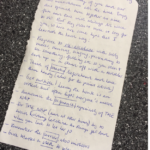Our vision is that every father takes parental leave to act as the primary caregiver. At a minimum, we advocate that every dad commit to our Challenge of One: take one month of parental leave before your child is one year old, and be the one to provide primary care in that period.
One month is a long time with a baby. You’ll see your child grow and learn. You’ll be forced to establish your own baby-centric routines and habits. You’ll have time to learn how to read your child’s body language, and will figure out how to soothe and comfort your baby. One month will give you many private moments - of frustration and exhaustion, but also of laughter and joy - that will make you appreciate fatherhood, and parenthood, in new ways.
Importantly, if you take less than one month of parental leave, it’s more likely to feel like a temporary experience. The point is not to feel like you are ‘babysitting’, while you quietly count the days until you are back at work. What you’re after is the feeling of immersion, where you accept and embrace all that fatherhood offers. That will take time.
That said, we know that the amount of time each father can take will vary depending on many factor. We encourage you to take as much time as you can, but to first read carefully and engage with our community to learn how to expand the borders of what “as much as I can” means for you and your family.
p.s. To be clear, we advocate for you to take as much time as you can. A month is the minimum. There is no maximum!
There is no "right" moment to take parental leave, and we've found all kinds of different but amazing success stories. That said, we do have a recommendation. If you’re like most young families, you live in a dual-income household. If that's true, we feel best time for dad to take parental leave is when his partner's maternity leave ends. Why?
Firstly, dad, it’s good for your family. There will be more space for you as a father when your child is a few months old. Newborn feeding schedules put intense physical and emotional demands on mothers, and fathers often feel a bit out of the loop. But, as the child gets a little older, the feedings begin to space out and both baby and mama naturally make more space for papa to get involved.
Secondly, it’s good for you. While your partner is on maternity leave, your physical and emotional experiences of fatherhood are shared and buffered. Your relationship with your child is not yet wholly your own. Don’t get us wrong - there is great joy and value to spending time together as a family. However, we think the best way to discover the true strength of your father-baby bond when you spend time alone together with your child.
Lastly, it’s good for the health and development of your child. It means your child gets an extended amount of time with a parent, before alternative care arrangements are needed.
Part of the objective of taking parental leave is to fully appreciate what it means to be responsible for your child’s well-being. Many fathers know how to change a diaper, give a bottle and calm a crying child. That’s fantastic. But to truly establish your own parenting style, it's best to take the lead at home.
If your partner is going back to work, then you won’t have trouble making this happen. When the door closes that first day and you’re alone with your child, you’ll be surprised at the intensity of the experience. But, you'll be amazed how quickly you build your own rhythms.
If your partner plans to stay home while you’re on parental leave, it may be more difficult for you to assert yourself. Work together to create the time and space you need to do parenting your way, and encourage your partner not to hover, judge or intervene. In turn, you’ll need to resist the temptation lean too heavily on your partner, or give up when the going gets tough. Don’t worry about doing it “wrong”. There is no wrong. Babies are more resilient than you think!
In reality, many governments and companies have already enacted legislation and policies to encourage the use of parental leave by men. While there is still a long way to go, we believe that cultural mindset is now the greatest barrier. There are millions of new and aspiring fathers who would like to take parental leave, but lack the confidence or vocabulary to speak openly about it with their peers, colleagues and employers. We want to create a community of empowerment. We want to build a movement that changes cultural mindsets. If we change cultures, the laws and policies will continue to move forward as well.
It's true that the tension between career and family is not a new problem. It's a well-documented frustration for generations of working women and remains a problem today. But encouraging men to take parental leave is an important part of the struggle for gender equality, at home and in the workforce. Don't take our word for it. The evidence speaks for itself.
With the slow emergence of paternity leave and parental leave, more men are considering time away from the workforce, and are beginning to appreciate all of the associated anxieties that women have traditionally faced. Our concern is that the conversation remains polarised: both women and men are still forced to decide to Lean-In, or make hard choices and accept that they “still can’t have it all”. We intend to reframe the conversation and reshape the notion of a career so that parental leave becomes the norm, not the exception. If all working professionals take parental leave - and are more accepting of colleagues, friends and employees who do the same - then we'll have made meaningful social change for both men and women.
Parental leave is typically granted to parents with young children - often, leave (paid or unpaid) must be taken before your child turns one. So legally, perhaps the answer is "yes". But Take The Time's core message is that it's amazing to invest time in your relationship with your child. So in that sense, it's never too late, but it might mean thinking more creatively about how to create the time that you want. If you're not sure what you can do, contact us and we can help you make a start.




